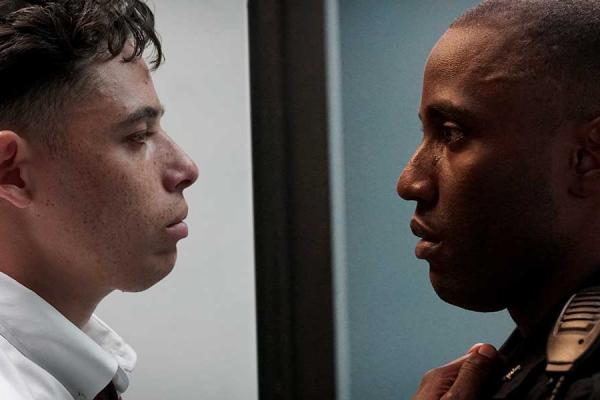John David Washington and Kelvin Harrison Jr. are two of the stars of the new film Monsters and Men, currently playing at the Toronto International Film Festival. The film tells the story of a police shooting of an unarmed black man in the Bedford-Stuyvesant neighborhood of New York, from three different perspectives.
Washington (who also recently starred in the Spike Lee film BlacKkKlansman) plays Dennis, a black police officer in the neighborhood, torn between reacting to the discrimination he sees and experiences every day, and his loyalty to his calling as a police officer. Harrison plays Zyric, a high school baseball player who feels moved to work for change after the killing, and after his own frightening run-in with two white officers in his neighborhood. His growing activism puts his hopes of playing college ball, and getting a scholarship, at risk.
Sojourners spoke to Washington and Harrison about the dialogues the film encourages, what they learned while preparing for their roles, and how those experiences inform the actors’ perspectives on racial injustice and the relationship between police and people of color.
This interview has been lightly edited for clarity and length.
Abby Olcese, Sojourners: John David, I know you mentioned that you’d done some ride-alongs with officers of color to prepare for your role in this film. Were you surprised by any of what you learned? Did you have any preconceived notions going into the experience that were challenged?
John David Washington, actor, Monsters and Men: Yeah, how it’s hard to turn the job off. I experienced some sleepless nights [while shadowing], but this is their life, all day, every day. Also, some of the community outreach programs — I didn’t know they played basketball with people in the communities. That was great. I didn’t know that they actually know how to talk to people in their neighborhoods. There’s a language that they understand, that they can use to talk with kids in the community.
There was a story that one of [the police officers] told me, there was a gang member, he was a Crip, and he was leaning on the car, and came up and told him, “thank you guys.” This Crip said “thank you guys,” because he had a cousin that was near death, and it was these police officers that saved him. Now, he’s gonna do what he does, and [the officer] is gonna do what he does, but at least there’s an understanding and a respect for one another. That to me, right there, is progress and I would like to see more examples like that, more stories like that, so that was important to me to get that kind of information.
Olcese: Between this film and BlacKkKlansman, you’re playing a cop in two movies this year that have very different atmospheres to them. How did those two preparation experiences, and your approaches to the material, change between the two films? Did working on both of these movies in close proximity to each other impact your understanding of police work?
Washington: Both experiences did, since we kind of shot them back to back. While I was researching for one, it informed the other. It was a great experience. I’d say the BlacKkKlansman approach wasn’t as heavy in the experience of research. It was heavy in other ways, but not like those ride-alongs [for Monsters and Men]. I had to get in touch with the 70s and late 60s. I was doing a lot of interviews with people of that generation. So, it was different in a lot of ways.
Olcese: What were some of the heavier parts of preparation for BlacKkKlansman?
Washington: There was this kind of lexicon of hate, this vernacular that was spoken generationally [by characters in the film] that I had to come into and be a part of. To be able to infiltrate that hate, I had to use these words, I had to hear these words. And it was kind of intimidating to have to step into a living person’s shoes. There’s a responsibility when it comes to our craft, but there’s an extra sense there because this man [Ron Stallworth] is still alive, and some of the things he shared with me which I can’t talk about were very deep.
Olcese: Kelvin, this film is all about perspective and dialogue. Your character in the film has a pretty specific perspective that he’s coming from. What was your perspective on police brutality and Black Lives Matter coming into this project? How did that match up or differ from your character’s experience?
Kelvin Harrison Jr., actor, Monsters and Men: All my life experience went into this character. It’s funny, because the previous year I’d finished a film that [Washington] and I did called Monster, about a 16-year-old kid who gets accused of being involved in a murder. I finished that movie feeling so lost, in a way, hopeless. I came from a private school in New Orleans, and everyone thinks that when you’re from the south that you must experience a lot of racism. I didn’t — my parents did a good job of protecting me from that. Coming out of that and into the real world, and, to an extent, into Hollywood, it became, “You’re a black boy, and we see you as this, and these are the roles you’re going to get, and you want that role, you’re not getting that role.”
So, I walked into this movie thinking, “I get where [Zyric’s] coming from.” Of course he just wants to play baseball. Of course he just wants to go to college. He wants to live his life, the end. He wants to take care of his family and be happy. He just wants to be human. Suddenly, he gets pulled over by a cop, and is like “wow, this is happening to me now. I’m not excluded, I’m not exempt … I’m not any of these things, I’m a black boy in America.” I think seeing my life and his life and going through that process and experience of the story was an awakening for me, and it helped me develop an appreciation for what protesting is, and what causes a person to speak out.
Olcese: For both of you, this year at the Toronto International Film Festival, there seems to be a theme of diversity and access, from the films selected, the push for diversity in press representation, and other events surrounding the festival. How does Monsters and Men add to that ongoing conversation? How does it add to the growing number of films on this topic?
Washington: It seems like a small victory. We’re standing on the shoulders of the Sidney Poitiers and Spike Lees of the world. So, it seems like their work has counted for something. Hopefully we can get more men and women, diversity, into the rooms that greenlight these movies, the executive seats, and video villages. Some of these network shows. That would be even better progress. So, it’s a great step, but hopefully we inspire those who love movies, who don’t want to act or direct, but know talent, know stories, and can get those stories told. We need more women, men, who look different to be able to come into that power and give people like us jobs.
Harrison: There’s still the Latin American community, there’s the Asian community, like Crazy Rich Asians, that’s a huge milestone for everyone. I think just constantly allowing stuff like that to happen. And even just looking at the films that are here [at TIFF], one of the more special ones, If Beale Street Could Talk, is about a love story, and not like our movie, or The Hate U Give. It’s great that we are talking about these topics, but it’s also great to see us just be.
Got something to say about what you're reading? We value your feedback!







